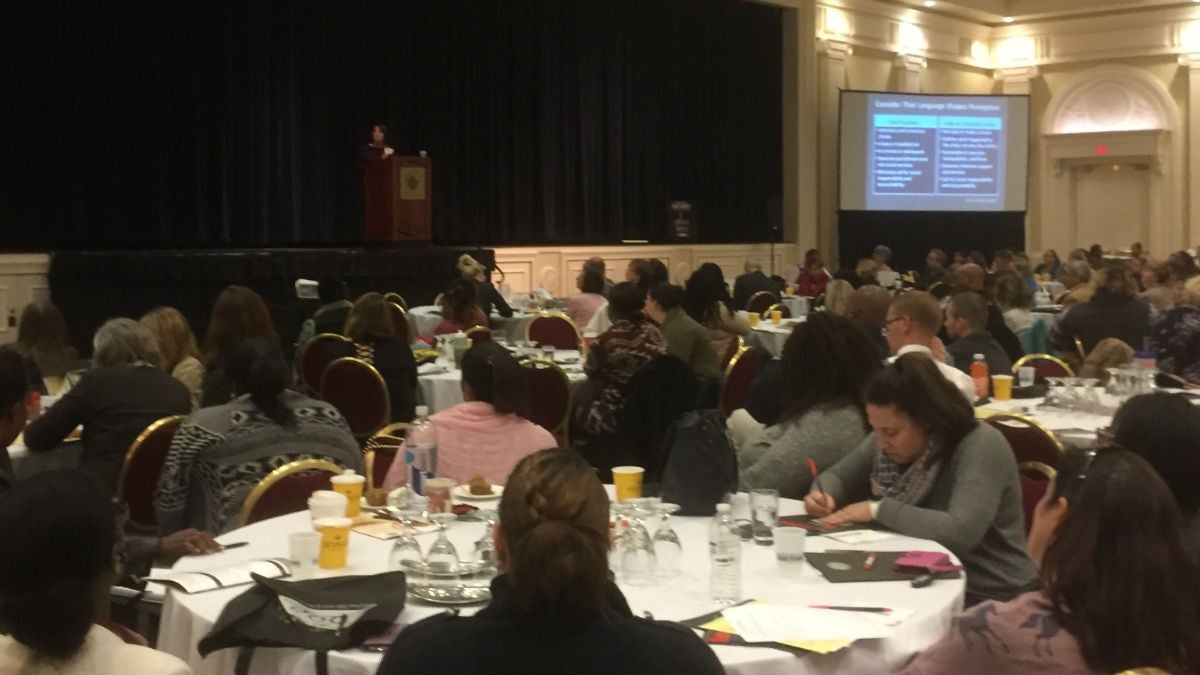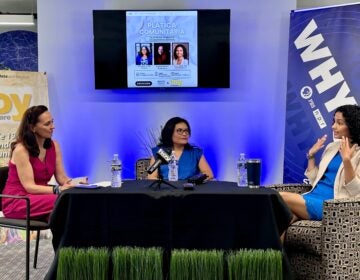Delaware hosts first human trafficking conference

(Andrea Gibbs/WHYY)
Delaware hosted its first human trafficking conference on Thursday to educate professionals in the law enforcement, health and social work fields.
There are hundreds of women and some men in Delaware who struggle day-to-day with the hardships of the sex trade, according to advocates.
Many are trafficked and forced into what’s known as “the life” as children or adults. Others got involved in prostitution to fund their drug addiction or as a way to support themselves financially.
These women, who often have traumatic histories, risk their lives every day.
While there have been some organizations and individuals dedicated to helping this population, the issue of trafficking has only recently been gaining statewide attention.
On Thursday more than 600 professionals in the medical, social work, law enforcement and judicial fields attended the state’s first human trafficking conference at Dover Downs in Dover.
The conference was organized by Yolanda Schlabach, the founder of Zoë Ministries, an organization dedicated to eliminating sex trafficking in the state.
“This is an issue that has laid dormant in the public eye for many years, with a few batches of people throughout the state who have been aware of the problem. But this conference is so important because it brings not just the awareness to the professionals, but brings cross collaboration across systems with professionals,” Schlabach said.
“It’s important law enforcement understands trauma informed care, it’s important medical knows what the kids department is doing, it’s important adult behavioral health understands what judiciary is doing. We all have to understand what’s happening in our systems in order to make this work statewide.”
During the conference keynote speakers from various states discussed how they have addressed issues like child trafficking in the areas of social work and law enforcement. Local experts also educated professionals on their own experience working with trafficking survivors.
Attendants then broke out into training sessions in the areas of health, law enforcement and judiciary, child and youth services and adult behavioral health. These sessions ranged in attendance from 110 to 280 professionals, with child and youth services being the largest group.
Schlabach said her goal for the conference is for it to be a launching pad for professionals, so they can use the training and education in their own work environment, and make productive changes to address the issue of trafficking.
Kristan Hudson, a judicial case manager at Superior Court in Sussex County, said she attended the event to gain a clear understanding of what other states and agencies are doing to tackle trafficking, and learn how those strategies can be implemented in Delaware legislation. She said the event was eye-opening.
“I thought it was important to have more than a base knowledge of the types of things we’re going to be encountering in court rooms, what victims could look like and also what types of services as a state are going to be provided, so we are aware and able to address those in the courtroom as well,” Hudson said.
Carl Colantuono, development director for the Salvation Army in Delaware, said he wanted to learn more about trafficking so his organization can better serve survivors.
“We know we’re already serving this population, so we wanted to learn more how we could serve them better,” he said. “Salvation Army sees itself nationally as an organization that has signature programs in the anti-human trafficking field. In Delaware, our programs are baseline basic needs. We have shelter, we have food, we have counseling. We’re finding out how we can better serve [the trafficking] population.”
Sierra Martinez, a social worker, said she’s always been passionate about the issue of trafficking and wanted to learn more about what efforts were underway in Delaware. She said she learned how to empower her clients and to not come across as judgmental.
“I think when you’re able to go to trainings like this it makes you aware of a situation you could be entering where someone is being trafficked, and by having those trainings it makes you aware of the targets that could be in place,” Martinez said.
“You could be witnessing something and based on the training you could be aware of it and change someone’s life. And I think that’s what’s missing is awareness, and I think that’s why there’s so many people here today. We’ve never had something like this in Delaware before where we’ve had a human trafficking conference with speakers where it’s been brought to life.”
Amy Thompson, a physician at A.I. duPont Hospital for Children in Wilmington, led a training session for health professionals on how to address patients who are trafficking victims. Her hospital has a forensic nurse examiner program, which provides services to adolescents facing sex abuse or assault. Thompson said there have been three incidents at her hospital where patients have been involved in trafficking, and staff was able to intervene to provide resources.
“I felt like I had experience taking care of adolescents who came in with that chief complaint, coming in saying, ‘I have been abused.’ It was eye opening to find out the extent of the commercial sex trade affecting our patients,” she said.
“Learning how to look for the red flags, learning this is happening in your community, learning how to ask the questions and learning what to do when the kid says yes is so important and not something I ever had in any of my medical school training or post-graduate training. If you don’t know how to look for it or aren’t aware of it you’re not going to diagnose it and start helping those patients.”
Hugh Organ, the associate executive director for Covenant House in Philadelphia, which provides services to homeless, runaway and trafficked youth, educated youth services professionals on how to best service child trafficking victims.
“There are a number of red flags, the biggest one that always stands out to me is runaways. Kids that run away more than three times or stay away from home more than 30 days of time, because what child can live on their own without the assistance of an adult for an extended period of time?” he said.
“The main thing is to ask questions. In 16 years of doing this I’ve never worked with anyone who came to me and said, ‘I’m a victim of human trafficking.’ Most victims don’t identify as victims of human trafficking, so you have to recognize what the red flags are and ask questions.”
Barb Loftus, an RN and licensed professional counselor of mental health, brought the audience to tears when she spoke about the women she worked with through SOAR, a Wilmington organization providing services to survivors of sexual trauma. She spoke of the deep depression and shame the women felt, and traumas they experienced as children or working in the life.
“My goal today was that the audience members would see the humanity of each woman who sat at my therapy table,” Loftus said. “Statistics are important to speak of the enormity of the problem. But I think the personal stories—that just let everyone know these are real people, these are people who deserve our attention, our respect.”
She also made a point in explaining that even the women in the life who aren’t trafficked by another individual, are facing the same trauma and those who were and need as much attention.
Loftus taught a session for adult behavioral health professionals, explaining the challenges that come along with working with this population, and how to approach them in an effective manner.
“I think we get into a professional mode sometimes and we have to realize these are people. These are not a group of symptoms, these are not a group of bad outcomes from childhood abuses, these are human beings,” she said.
“What they needed was someone to sit at the table, and get to know them, and model things for them, and care about them, and bring cream for their coffee and not judge them, not tell them what to do. And that’s true with all of us. I don’t want anyone looking at me as a project or someone who needs to be fixed in any particular way.”
Schlaback said it’s important for professionals to understand the need for victim-centered approaches to trafficking.
“We can sit behind our desks and decide what we think is best for these victims, but the reality is until we identify victims statewide and we hear from them, ‘What do you need?’ They need housing, they need education, they need life skills and they need a safe place to say and they need non-judgmental rehab and detox,” she said.
“When we hear from the victims, ‘This is what I need to come out of the life,’ we need to stop and take note and pay attention to that, because they know what they need way better than we know what they need.”
WHYY is your source for fact-based, in-depth journalism and information. As a nonprofit organization, we rely on financial support from readers like you. Please give today.





